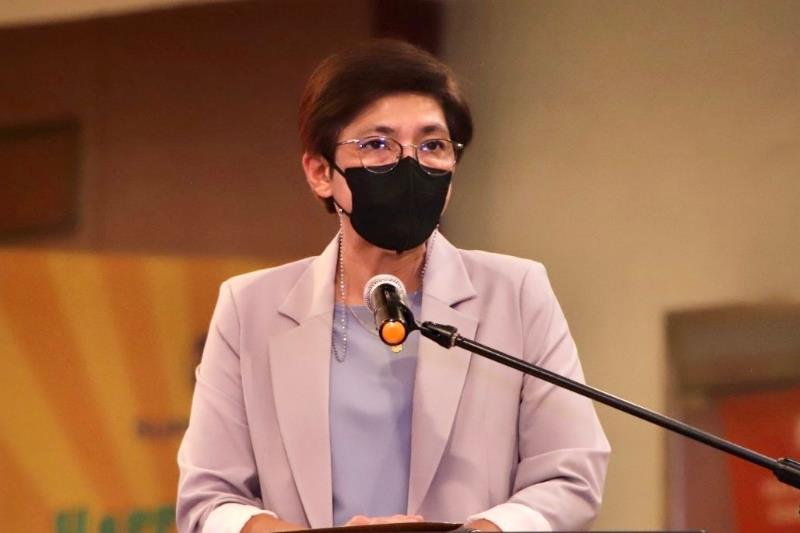
Department of Health (DOH) officer-in-charge Maria Rosario Vergeire said vaccine manufacturers Pfizer and AstraZeneca are willing to submit their documents to the Senate and the Commission on Audit (COA) “under specific terms.”
This was her response as the Department of Health (DOH) was pressed on the issue on non-disclosure agreements (NDA) between the government and vaccine suppliers during the Senate Blue Ribbon Committee hearing on Wednesday,
As such, the DOH said, as early as 2021, has coordinated with vaccine manufacturers to secure their consent to disclose information and enable procurement audits free from legal liability.
Of the manufacturers, AstraZeneca and Pfizer have given their consent for DOH to disclose information “under specific terms.”
“My response to the request of COA would be that the information will be provided through the executive session for Pfizer and then for others, we are still waiting,” Vergeire said adding that AstraZeneca is also “willing to share their documents.”
Vergeire also asked COA to reiterate their communication officially with the DOH so that they can already facilitate the documents.
As to other manufacturers, Vergeire said that “they are not responding” whike Sinovac already told them in 2021 that they cannot share their documents.
Determine accuracy on vaccine doses wastage
Sen. Francis Tolentino on said that the hearing on the alleged NDA on the information on vaccine procurements aims to determine the accuracy of the 44 million wasted vaccine doses.
“We are not here to determine whether the price was different from other acquisitions or purchases made by other jurisdiction, we are not here to determine wrongdoing in so far as the purchases, procurement made then, and we are not here to ascribe any malfeasance, misfeasance or any violation of existing penal laws,” Tolentino, who is also the chairman of the committee said.
Tolentino said that they also want to know’ whether the accuracy of the P44 million wasted doses of various vaccines “were really accurate and made within the bounds and parameters of what can be wasted.”
“And we are here to determine whether those policies can be corrected,” he added.
Ensure minimal vaccine wastage
The DOH reiterated also reiterated its commitment to ensure that vaccine wastage is minimized and taxpayer money is well-spent and accounted for.
Following recent reports that millions of doses of vaccines stocks have expired, Vergeire explained that based on their inventories, bulk of the wastage comes from procurements made by the private sector (44.82 percent ) and local government units (33.35 percent).
On the other hand, out of the total vaccines procured by the national government financed through general appropriations and loans from the World Bank and the Asian Development Bank (ADB), the DOH revealed that only 2.02 percent or 2.7 million out of 134 million of the total number of procured vaccines have expired.
Vergeire said that the price is over a billion pesos if the amount of a vaccine dose is P500.
The DOH underscored that this sits well below the globally recognized maximum allowable vaccine wastage rate of 25 percent set by the GAVI alliance, and may even be viewed as being significantly lower relative to vaccine wastage rates recorded in other countries, which go as high as 30 percent.
Furthermore, the DOH revealed that 10.95 percent of the country’s total accumulated expired vaccines was donated through the COVAX facility.
It has secured the commitment of the COVAX facility to replace expired doses with bivalent vaccines which better contribute to vaccination efforts.
While the DOH noted that vaccine wastage is inevitable, the agency continues to implement strategies to reduce the occurrence of wastage by employing effective supply chain management and boosting vaccination rates amidst low vaccine uptake.
Proactively uphold accountability
The DOH, in a statement, manifested its commitment to proactively uphold accountability and transparency in the country’s Covid-19 vaccine procurements during the initial public hearing held by the Senate Committee on Accountability of Public Officers and Investigations
“The DOH, led by Officer-In-Charge Maria Rosario Singh-Vergeire, likewise reiterated that it will continue to exhaust all efforts to ensure that vaccine wastage among national government-procured vaccines remains minimal.”
As part of the discussions, the DOH emphasized that the Covid-19 vaccine procurement portfolio is extensive, requiring a broad range of highly-specialized skills exclusively carried by specific government agencies. As such, facilitating the procurement process – from negotiations until the delivery and rollout of the procured doses – requires a whole-of-government approach, with different agencies leading different components of the process through identified task groups as specified under DOH Administrative Order (AO) 2021-0005 or the National Strategic Policy Framework for Covid-19 Vaccine Deployment and Immunization.
Proactive
During the hearing, Vergeire stated:”The DOH doesn’t have any issues with being subjected to audits for these vaccine procurements. In fact, the DOH requested specifically from COA for these audits.”
Moreover, the DOH clarified that it has always been willing to provide the needed information on vaccine procurement, in response to issues surrounding its alleged refusal to provide the said information to Congress and the due to the NDAs.
The DOH reiterated that it has, in fact, been very proactive in requesting for the conduct of a special audit for the Covid-19 vaccine procurements, as evidenced by official DOH correspondences to COA as early as 2021.
Despite the NDAs posing a potential hurdle to full disclosure, the DOH clarified that the DOH and NTF will comply with all COA audit requirements.
The agency explained that disclosing information covered by the confidentiality agreements without explicit consent from the manufacturers has legal as well as public health repercussions.
Such disclosure, the DOH said, may result in manufacturers’ loss of confidence, which may, in turn, harm the country’s future prospects to be prioritized or even to secure life-saving vaccines and other products for Filipinos.
Image credits: DOH/Facebook
